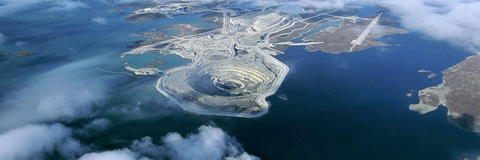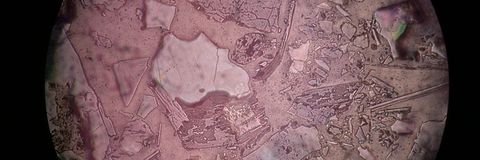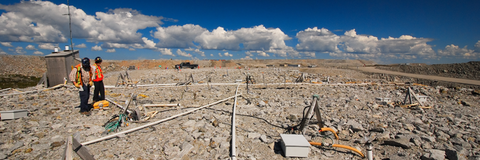


Welcome to Groundwater Geochemistry and Remediation Research Group
Group Biography
The Groundwater Geochemistry and Remediation Group (GGR) at the University of Waterloo, led by David Blowes and Carol Ptacek, is committed to advancing the understanding of the fate, transport and remediation of contaminants including metals, metalloids, pathogens, nutrients and emerging contaminants in groundwater. This research includes detailed field investigations, laboratory studies, development of reactive barriers and other passive remedial solutions, application of non-traditional isotope techniques and development of mathematical models to predict the complex geochemical behaviour of these systems.
We have conducted studies at mine sites, mine-waste disposal facilities, wetlands, on-site sewage disposal systems and other industrial sites. Laboratory studies often focus on reaction mechanisms utilizing batch and column experiments. Mathematical modeling has focused on the development of fully-coupled reactive transport codes that can account for thermodynamic and kinetic controls on chemical reactions between groundwater and the aquifer material. Remediation research is focused on the development of passive, in situ, methods including permeable reactive barriers.
NSERC Toward Environmentally Responsible Resource Extraction Network (NSERC-TERRE-NET)
The NSERC-TERRE-NET Program, led by David Blowes, is currently recruiting undergraduate co-op, MSc and PhD students, and Post-doctoral Fellows for exciting field, laboratory, and modelling research projects made available through this recently-awarded NSERC Strategic Partnership Grants for Networks program. NSERC-TERRE-NET is a multi-institutional and multi- and trans-disciplinary research Network comprised of 15 co-investigators from 7 universities across Canada, with the overarching goal of ensuring the:
Environmentally responsible, socially acceptable extraction of mineral and energy resources using cutting-edge approaches and technologies.
This initiative is supported by numerous partner organizations, as well as Canadian and international research collaborators. Qualified candidates with backgrounds in geochemistry, hydrogeology, mineralogy, reactive transport modelling, and/or environmental microbiology are invited to contact David Wilson to inquire about available projects.
News
News Release: Influence of Mine Dewatering-Effluent Cycling on Arsenic Loading in a Gold Mine Tailings Containment Area
Researchers from the University of Waterloo have recently published a paper in the Water Resources Research journal, "Influence of Mine Dewatering-Effluent Cycling on Arsenic Loading in a Gold Mine Tailings Containment Area".
News Release: Canadian Light Source, Organic Material can convert Toxic Heavy Metal to Harmless Form
Researchers from the University of Waterloo have discovered that a special form of charcoal is highly effective at absorbing toxic chromium and transforming it into its safer form.
News Release: Better Monitoring of Mining Remediation
A new testing technique developed using synchrotron light could significantly improve how we monitor the effectiveness of remediation practices for removing selenium contamination from mining activities.